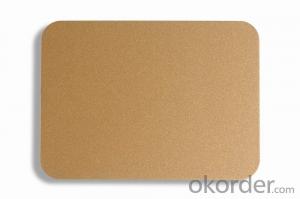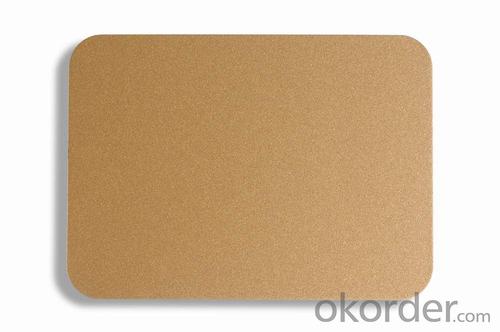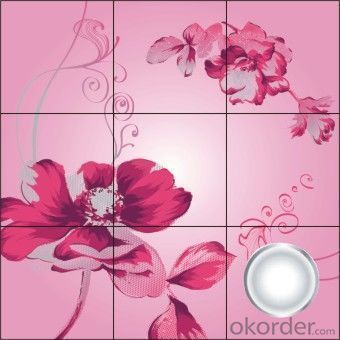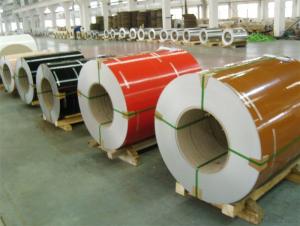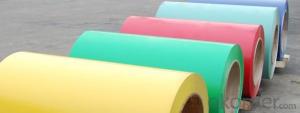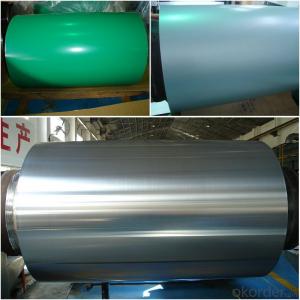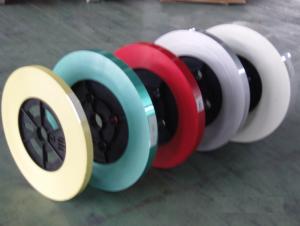Black and White PVDF/PE Coated Aluminum Coil
- Loading Port:
- Shanghai
- Payment Terms:
- TT OR LC
- Min Order Qty:
- 8 m.t.
- Supply Capability:
- 2000 m.t./month
OKorder Service Pledge
OKorder Financial Service
You Might Also Like
Specification
Structure of Aluminium Coated Coil with PVDF/PE Coating Description:
Coated aluminum coil/sheet are of a wide range of colors, which gives wonderful appearance no matter in residential and commercial constructions of great exhibition centers.
The coated aluminum coil/sheet have been widely used in the fields of construction and decoration( garage doors, ceiling etc.), electronic appliances, lighting decoration, air-condition air pipes, sandwich panels and drainages etc.
Main Features of the Aluminium Coated Coil with PVDF/PE Coating:
1) High flexibility
2) Impact resistance
3) Excellent weather-proof durability
4) Anti-ultraviolet
5) High erosion resist
Images of the Aluminium Coated Coil with PVDF/PE Coating:
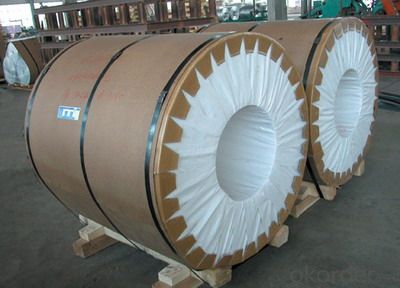
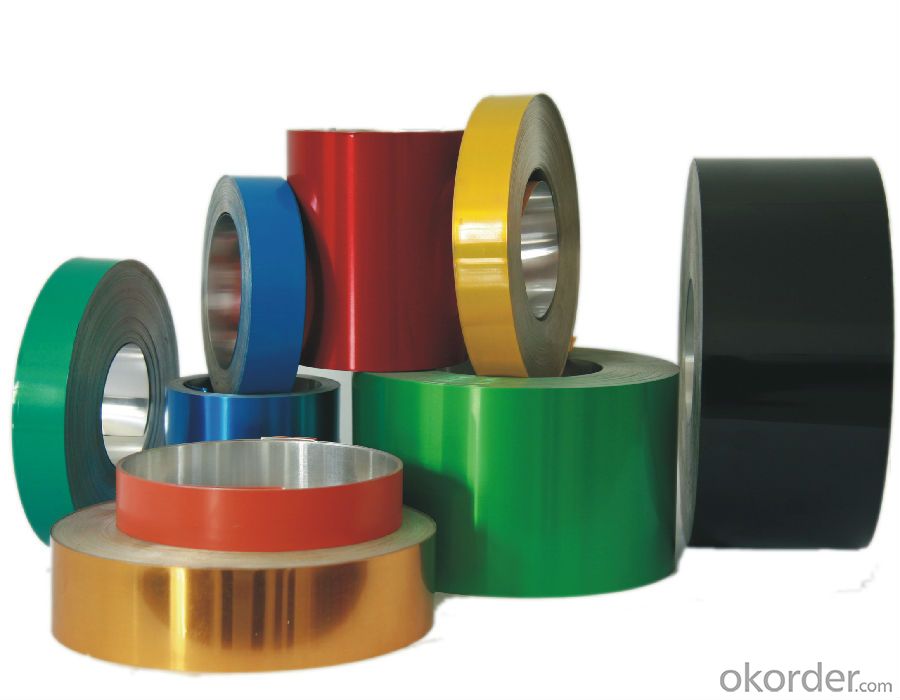

Aluminium Coated Coil with PVDF/PE Coating Specification:
Alloy | A1100,A3003,A1050,A8011 etc |
Temper | H16,H18,H24 |
Thickness | From 0.024mm to 1.2mm |
Width | Standard width:1240mm |
Special width:1300mm,1520mm,1570mm,1595mm | |
Diameter | Standard dia:1200mm |
Interior dia:150mm,405mm,505mm | |
Weight | 2.5 T/coil,3.0 T/coil |
Coating | PE, PVDF, AC |
Surface | Embossed, mill finish, coated |
Color | AS to code RAL |
Gloss | 10-90%(EN ISO-2813:1994) |
Coating Thickness | PE: more than 18 micron |
PVDF: more than 25 micron | |
Coating Hardness (pencil resistance) | More than 2h |
Coating adhesion | 5J(EN ISO-2409:1994) |
Impact Resistance | No peeling or cracking(50 kg/cm,ASTMD-2794:1993) |
Flexibility (T-bend) | 2T |
MEK resistance | More than 100 |
FAQ Aluminium Coated Coil with PVDF/PE Coating:
a.What is monthly capacity
---CNBM is one stated own company and our monthly capacity is about 2000tons.
b. Now which countries do you export your goods?
---Now we export to South East Asia,Africa, North America,South America ect.
- Q: Guangdong where there are professional to do around the paper corner, is packing steel coil, aluminium coil that protect the edge of the both ends of the cylinder. Just the kind of picture.
- Tell you, the obvious answer is that manufacturers asked and answered, I also purchased a number of Companies in the last, the effectiveness is not as good as they say!
- Q: How do aluminum coils contribute to noise isolation?
- Aluminum coils can contribute to noise isolation in several ways. Firstly, the use of aluminum as a material for coils provides excellent thermal and electrical conductivity, which helps to dissipate heat and electromagnetic interference. This reduces the chances of noise generated by these factors. Additionally, aluminum coils can be designed with specific properties that enhance noise isolation. By using thicker aluminum wire, the coil can have a higher resistance, reducing the transmission of electrical noise. Furthermore, the shape and size of the coil can be optimized to minimize vibrations and resonance, which are common sources of noise. Furthermore, aluminum coils can be used in conjunction with other noise isolating materials. For example, they can be combined with acoustic foam or other sound-absorbing materials, creating a barrier that prevents sound transmission. The aluminum coil acts as a structural support while the additional materials absorb and dampen sound waves, further enhancing noise isolation. Overall, aluminum coils contribute to noise isolation by dissipating heat and electromagnetic interference, minimizing vibrations and resonance, and providing a structural support for other noise isolating materials.
- Q: Can aluminum coils be used in low-friction applications?
- Yes, aluminum coils can be used in low-friction applications. Aluminum is a lightweight and corrosion-resistant material that has excellent thermal conductivity. These properties make it suitable for various applications where low-friction is desired. In industries such as automotive, aerospace, and HVAC systems, aluminum coils are often used in heat exchangers, evaporators, condensers, and cooling coils. These coils are designed to efficiently transfer heat, while minimizing friction and energy loss. Additionally, aluminum coils can be used in electrical motors, generators, and transformers, where low friction is essential for smooth operation and reduced energy consumption. The lightweight nature of aluminum also helps to reduce the overall weight of the system, leading to improved efficiency. Furthermore, aluminum coils can be utilized in various types of machinery and equipment that require low friction, such as conveyor systems, sliding mechanisms, and bearings. Aluminum's low coefficient of friction allows for smooth and efficient movement, minimizing wear and tear on the components. Overall, aluminum coils are a versatile solution for low-friction applications due to their lightweight, corrosion-resistant, and thermally conductive properties. Their use can lead to improved energy efficiency, reduced maintenance costs, and enhanced performance in a wide range of industries.
- Q: What is the role of aluminum coils in the automotive industry?
- Aluminum coils play a crucial role in the automotive industry as they are used in the manufacturing of various vehicle components. These coils are primarily utilized in the production of heat exchangers, such as radiators and condensers, which are responsible for regulating engine temperature and air conditioning systems. Aluminum coils offer excellent heat transfer properties, lightweight construction, and corrosion resistance, making them ideal for enhancing vehicle performance and fuel efficiency. Additionally, they are also utilized in the fabrication of body panels, frames, and suspension components, contributing to the overall weight reduction of automobiles.
- Q: Can aluminum coils be used for architectural facades?
- Yes, aluminum coils can be used for architectural facades. Aluminum is a popular material for architectural applications due to its lightweight nature, durability, and flexibility. It can be easily molded and shaped into various forms, making it suitable for creating unique and aesthetically pleasing facades. Additionally, aluminum is resistant to corrosion, making it a long-lasting choice for exterior applications.
- Q: This question asks about the environmental effects that aluminum coils may have on the environment.
- <p>The environmental impacts of aluminum coils are multifaceted. Aluminum production, particularly the extraction and refining process, consumes significant energy and can result in greenhouse gas emissions. The mining of bauxite, the primary source of aluminum, can lead to deforestation and habitat destruction. However, aluminum coils are recyclable, which reduces their environmental footprint compared to non-recyclable materials. When recycled, aluminum saves up to 95% of the energy needed to produce new aluminum, reducing emissions and waste. Despite these benefits, improper disposal or incineration of aluminum can still contribute to pollution. Overall, the environmental impact of aluminum coils is complex, with both negative and positive aspects depending on production methods and waste management practices.</p>
- Q: I would like to know because I'm getting a sword with an aluminum sheathe.
- Well, they make airplanes out of it so it's pretty strong. It has a good shearing strength. Now, over time, yes, you would wear the sheath with the steel blade, but I doubt you'll need to worry about it too much.
- Q: Can aluminum coils be used for outdoor applications?
- Indeed, outdoor applications can utilize aluminum coils. Aluminum, as a material, possesses outstanding versatility and durability, enabling it to endure diverse weather conditions and temperatures. Its resistance to corrosion renders it suitable for outdoor environments that encounter moisture and humidity. Moreover, aluminum coils boast a lightweight characteristic, facilitating their transportation and installation within outdoor settings. Consequently, they find frequent usage in outdoor applications encompassing roofing, siding, gutters, and HVAC systems. Taken together, the strength, corrosion resistance, and longevity of aluminum coils establish them as a dependable option for outdoor applications.
- Q: Can the little can opening cap things on an aluminum can be recycled? My friend told me if you fill a two liter bottle with them you can get loads of cash. Is this true?
- Yes. Aluminium can be recycled. (watch the TV ad, UK) No. You would need tons of the stuff ( a tonne of copper is only around ?1000) They are usually colleced for charity. And they save up all the 2 litre bottles full! Feel the weight, aluminium is very light.
- Q: How are aluminum coils used in the production of battery enclosures?
- Aluminum coils are used in the production of battery enclosures as they provide a lightweight and durable material that can be easily molded and shaped to form the enclosure. The coils are typically processed and formed into specific shapes using a combination of heating, rolling, and cutting techniques. This allows for the creation of seamless and tightly sealed enclosures that can protect the batteries from external elements and provide efficient heat dissipation.
Send your message to us
Black and White PVDF/PE Coated Aluminum Coil
- Loading Port:
- Shanghai
- Payment Terms:
- TT OR LC
- Min Order Qty:
- 8 m.t.
- Supply Capability:
- 2000 m.t./month
OKorder Service Pledge
OKorder Financial Service
Similar products
Hot products
Hot Searches
Related keywords
